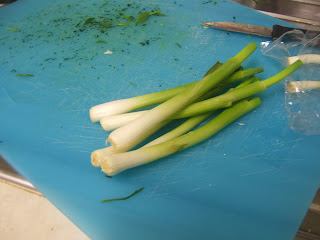The first reason for this is that it is very very good: good for you as well as delicious.
This is called ash-e-reshteh, meaning noodle soup in persian. It is a hearty soup that you may not want to eat all the time but it's very comforting especially when the weather gets a bit chilly.
The second is because I am quite proud that it seemed to me unconquerable and now not only can I make it, but also came up with my own version. I don't know if it would pass the scrutiny of a 'proper Persian Cook', but my Persian husband likes it and it doesn't taste that different from the one that I have tried at Iranian restaurants, or more recently, in Iran.
The third reason is that I really need to record the recipe and method before I forget, so that I will be able to do it again without being confused as to what steps to follow. The quantities are enough to feed 4 reasonably hungry people as a main course and there may be some left over.
Ingredients :
Sabzi : herbs and vegetables, in this instance, spring onions, dill, fresh or frozen (I tend to bulk buy dill, freeze it and use it when needed, and once frozen it is also easy and convenient to chop), parsley, coriander, chives if you have them, spinach, I also like to add some leeks, one or two, again if any of these are frozen, or dried, it's fine too.
They should be about one or two bunches (market size or supermarket packets) of each depending on taste and preference
One onion, garlic
Dried mint and/or dried Ashe (soup) herb mix from Iranian grocery shops (again this is not absolutely essential as it is basically the dried version of what we are already using) but it gives the dish more flavour.
Pulses/ Beans:
Red Kidney Beans (one can or equivalent)
Chick peas (one can or equivalent or less if using the bean mix as well)
Lentils (Green/brown variety), freshly cooked or canned, some
One packet of ready cooked bean mix (possibly the Epicure brand 'Mediterranean' variety) as it contains broad beans and chick peas that are both called for in the recipe)
Spices:
Black pepper, freshly ground
Turmeric powder, one teaspoon
Other:
Kashk (salty whey product, that comes in a jar, from Iranian grocery shops or in a dried, powdered form), this can be omitted, if not found or liked but I absolutely love it. Some people substitute it with yogurt, but the taste is more similar to some salty strong sheep cheese except it is like a thin curd like paste.
Reshteh or Persian Noodles (you can substitute them with dry pasta or some kind of other wheat noodles)
If you are using any fresh beans/pulses soak and or cook them beforehand. I normally only do it for lentils, which are the easiest to cook and do not require soaking nor much planning ahead. Chop and brown the onion in a little oil or butter or a mixture of the two.
Take the sabzi, and roughly chop them up and add to the pan.
Next add salt, pepper and turmeric, transfer everything into a medium/ large sized pot and put everything to the boil with 6cups of water approximately. Let it cook for a while (30-45 min ca).
Now the cheating bit:
Add some ready cooked/ canned pulses, such as red-kidney beans, lentils and a packet of mediterranean mix of pulses or another mix,trying to include something with fava (broad) beans and optionally navy beans
Let it cook for another while, adding some more oil, if needed, adjusting the seasoning, adding may be some more dried herbs, or sauteed garlic and mint, and as the last step the Reshte or Persian Noodles. These should be cooked for about 15 minutes, as they don't need to be 'al dente' and the whole soup has to become quite thick and not much watery. I also add the kashk at this time and then bring some more on the table to be added at will. Sometimes people (or even I, when can be bothered) add some garnish made of thinly sliced fried onion with garlic and mint on top.
And I don't feel adding any more comments really, after all, in Italy we say that when you eat you are not supposed to talk (I must say though, that I have never witnessed this piece of advice being followed!) and in Southern Italy also that when you eat you are fighting with death.










